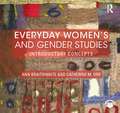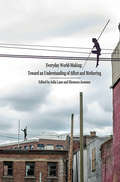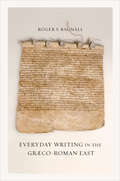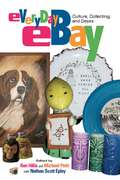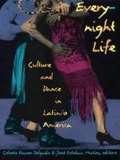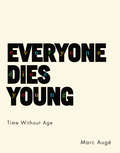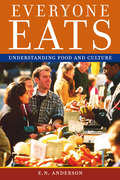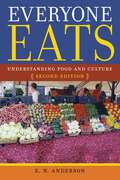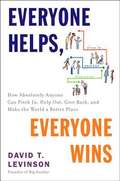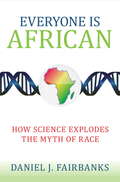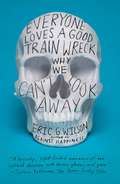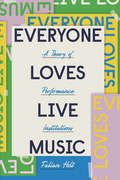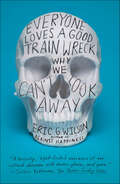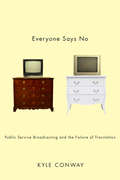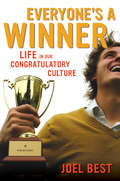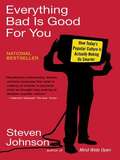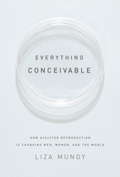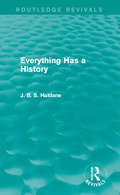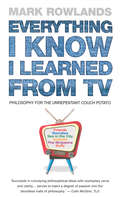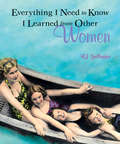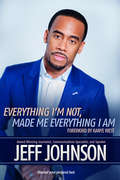- Table View
- List View
Everyday Women's and Gender Studies: Introductory Concepts
by Ann Braithwaite Catherine M. OrrEveryday Women’s and Gender Studies is a text-reader that offers instructors a new way to approach an introductory course on women’s and gender studies. This book highlights major concepts that organize the diverse work in this field: Knowledges, Identities, Equalities, Bodies, Places, and Representations. Its focus on "the everyday" speaks to the importance this book places on students understanding the taken-for granted circumstances of their daily lives. Precisely because it is not the same for everyone, the everyday becomes the ideal location for cultivating students’ intellectual capacities as well as their political investigations and interventions. In addition to exploring each concept in detail, each chapter includes up to five short recently published readings that illuminate an aspect of that concept. Everyday Women’s and Gender Studies explores the idea that "People are different, and the world isn’t fair," and engages students in the inevitably complicated follow-up question, "Now that we know, how shall we live?"
Everyday World- Making: Toward an Understanding of Affect and Mothering
by Julia LaneThis cross-disciplinary collection considers the intersection of affect and mothering, with the aim of expanding both the experiential and theoretical frameworks that guide our understanding of mothering and of theories of affect. It brings together creative, reflective, poetic, and theoretical pieces to question, challenge, and re-conceptualize mothering through the lens of affect, and affect through the lens of mothering. The collection also aims to explore less examined mothering experiences such as failure, disgust, and ambivalence in order to challenge normative paradigms and narratives surrounding mothers and mothering. The authors in this collection demonstrate the theoretical and practical possibilities opened up by a simultaneous consideration of affect and mothering, thereby broadening our understanding of the complexities and nuances of the always changing experiences of world-making.
Everyday Writing in the Graeco-Roman East
by Roger S. BagnallMost of the everyday writing from the ancient world--that is, informal writing not intended for a long life or wide public distribution--has perished. Reinterpreting the silences and blanks of the historical record, leading papyrologist Roger S. Bagnall convincingly argues, however, that ordinary people--from Britain to Egypt to Afghanistan--used writing in their daily lives far more extensively than has been recognized. Marshalling new and little-known evidence, including remarkable graffiti recently discovered in Smyrna, Bagnall presents a fascinating analysis of writing in different segments of society. His book offers a new picture of literacy in the ancient world in which Aramaic rivals Greek and Latin as a great international language, and in which many other local languages develop means of written expression alongside these metropolitan tongues.
Everyday eBay: Culture, Collecting, and Desire
by Ken Hillis Michael Petit Nathan Scott EpleyEveryday eBay is the first scholarly analysis of the internet marketplace that has become a global social, cultural and economic phenomenon. The eighteen new and classic essays gathered here examine eBay from a wide variety of perspectives as a bellwether of taste and material culture; as a rich site of cultural, racial, and sexual discourse and practice; as an emergent media form; and as a facilitator of global consumerism. From old toys steeped in nostalgia to 'rare' limited edition shoes, the contributors demonstrate that value on eBay is never simply about 'price'. On any given day, more than two million items are listed for sale on eBay, from everyday objects to kitsch and collectibles to the truly bizarre. Since its debut ten years ago, eBay has quickly become a central destination for millions of web browsers. According to eBay itself, up to 165,000 Americans now make their living by selling through the website, and other business analysts project that hundreds of thousands of individuals worldwide now make their living through eBay.
Everynight Life: Culture and Dance in Latin/o America
by José Esteban Muñoz Celeste Fraser DelgadoThe function of dance in Latin/o American culture is the focus of the essays collected in Everynight Life. The contributors interpret how Latin/o culture expresses itself through dance, approaching the material from the varying perspectives of literary, cultural, dance, performance, queer, and feminist studies. Viewing dance as privileged sites of identity formation and cultural resistance in Latin/o America, Everynight Life translates the motion of bodies into speech, and the gestures of dance into a provocative socio-political grammar.This anthology looks at many modes of dance--including salsa, merengue, cumbia, rumba, mambo, tango, samba, and norteño--as models for the interplay of cultural memory and regional conflict. Barbara Browning's essay on capoeira, for instance, demonstrates how dance has been used as a literal form of resistance, while José Piedra explores the meanings conveyed by women of color dancing the rumba. Pieces such as Gustavo Perez Fírmat's "I Came, I Saw, I Conga'd" and Jorge Salessi's "Medics, Crooks, and Tango Queens" illustrate the lively scope of this volume's subject matter.Contributors. Barbara Browning, Celeste Fraser Delgado, Jane C. Desmond, Mayra Santos Febres, Juan Carlos Quintero Herencia, Josh Kun, Ana M. López, José Esteban Muñoz, José Piedra, Gustavo Perez Fírmat, Augusto C. Puleo, David Román, Jorge Salessi, Alberto Sandoval
Everyone Dies Young: Time Without Age (European Perspectives: A Series in Social Thought and Cultural Criticism)
by Marc Augé"We are awash in time, savoring a few moments of it; we project ourselves into it, reinvent it, play with it; we take our time or let it slip away: it is the raw material of our imagination. Age, on the other hand, is the detailed account of the days that pass, the one-way view of the years whose total sum when set forth can stupefy us. Age wedges each of us between a date of birth that, at least in the West, we know for certain and an expiration date that, as a general rule, we would like to defer. Time is a freedom, age a constraint."Marc Augé remembers his beloved childhood cat, who seemed to grow wise with age, though her essential nature remained unchanged. He considers our belief that objects mature, when it is our perception of them that evolves over time. He wonders why public demonstrations of affection between the elderly make the young so uncomfortable and why we torture ourselves with regret at what might have been. Time can be liberating, he finds; it is a resource we can squander or relish. Yet age is a burden, bound by our personal and cultural neuroses. With an ethnologist's understanding of construct and practice, Augé isolates age from the development of consciousness, desire, and representations of the self. In bold, eye-opening strokes, he casts age as a physical marker and treats one's youthful approach to the world as the true measure of life's value.
Everyone Eats
by E. N. AndersonEveryone eats, but rarely do we ask why or investigate why we eat what we eat. Why do we love spices, sweets, coffee? How did rice become such a staple food throughout so much of eastern Asia? Everyone Eats examines the social and cultural reasons for our food choices and provides an explanation of the nutritional reasons for why humans eat, resulting in a unique cultural and biological approach to the topic. E. N. Anderson explains the economics of food in the globalization era, food's relationship to religion, medicine, and ethnicity as well as offers suggestions on how to end hunger, starvation, and malnutrition. Everyone Eats feeds our need to understand human ecology by explaining the ways that cultures and political systems structure the edible environment.
Everyone Eats: Understanding Food and Culture
by E. N. AndersonAn illuminating anthropological study of the ways that cultures and political systems structure the edible environment. Everyone eats, but rarely do we investigate why we eat what we eat. Why do we love spices, sweets, coffee? How did rice become such a staple food throughout so much of eastern Asia? Everyone Eats examines the social and cultural reasons for our food choices and provides an explanation of the nutritional reasons for why humans eat what they do, resulting in a unique cultural and biological approach to the topic. E. N. Anderson explains the economics of food in the globalization era; food&’s relationship to religion, medicine, and ethnicity; and offers suggestions on how to end hunger, starvation, and malnutrition. This thoroughly updated Second Edition incorporates the latest food scholarship, most notably recognizing the impact of sustainable eating advocacy and the state of food security in the world today. Anderson also brings more insight than ever before into the historical and scientific underpinnings of our food customs, fleshing this out with fifteen new and original photographs from his own extensive fieldwork. A perennial classic in the anthropology of food, Everyone Eats feeds our need to understand human ecology by explaining the ways that cultures and political systems structure the edible environment.
Everyone Helps, Everyone Wins
by David LevinsonThe director of one of the largest grassroots volunteer programs in the country shows how everyone can give back. Just in time for the season of giving, Everyone Helps, Everyone Wins will change how Americans give back to their communities. Once a self-proclaimed "reluctant volunteer"-too busy and unmotivated- David Levinson is now director of the largest regional volunteer network, Big Sunday, with an army of fifty thousand volunteers across California. Speaking to the reluctant volunteer in everyone, he boosts our "Volunteer IQ" with specific advice on how, where, and why we can help. He candidly addresses the benefits and pitfalls of volunteering. And he tackles situations and individuals across the spectrum-people with one free day a year, retirees, community organizers, and those who want to ensure their checks go to the right cause. With a list of "Fifty-two Ways to Give Back," David brainstorms ideas for traditional and offbeat ways to contribute to your community; each has the pros, the cons, and a how-to guide. Combined with a comprehensive appendic listing online and print resources, this book provides both the motivation and the action plan to get every community working. Sixty-one million Americans volunteered last year and many more made charitable donations. This will become the book they - and their community's organizers - all need to make sure their time and money are put to good use. .
Everyone Is African
by Daniel J. FairbanksWhat does science say about race? In this book a distinguished research geneticist presents abundant evidence showing that traditional notions about distinct racial differences have little scientific foundation. In short, racism is not just morally wrong; it has no basis in fact.The author lucidly describes in detail the factors that have led to the current scientific consensus about race. Both geneticists and anthropologists now generally agree that the human species originated in sub-Saharan Africa and darkly pigmented skin was the ancestral state of humanity. Moreover, worldwide human diversity is so complex that discrete races cannot be genetically defined. And for individuals, ancestry is more scientifically meaningful than race.Separate chapters are devoted to controversial topics: skin color and the scientific reasons for the differences; why ancestry is more important to individual health than race; intelligence and human diversity; and evolutionary perspectives on the persistence of racism.This is an enlightening book that goes a long way toward dispelling the irrational notions at the heart of racism.From the Trade Paperback edition.
Everyone Loves A Good Train Wreck: Why We Can't Look Away
by Eric G. WilsonWhy can't we look away? Whether we admit it or not, we're fascinated by evil. Dark fantasies, morbid curiosities, Schadenfreude: as conventional wisdom has it, these are the symptoms of our wicked side, and we succumb to them at our own peril. But we're still compelled to look whenever we pass a grisly accident on the highway, and there's no slaking our thirst for gory entertainments like horror movies and police procedurals. What makes these spectacles so irresistible? In Everyone Loves a Good Train Wreck, the scholar Eric G. Wilson sets out to discover the source of our attraction to the gruesome, drawing on the findings of biologists, sociologists, psychologists, anthropologists, philosophers, theologians, and artists. A professor of English literature and a lifelong student of the macabre, Wilson believes there's something nourishing in darkness. To repress death is to lose the feeling of life, he writes. A closeness to death discloses our most fertile energies. His examples are legion and startling in their diversity. Citing everything from elephant graveyards and Susan Sontag's On Photography to the Tiger Woods sex scandal and Steel Magnolias, Wilson finds heartening truths wherever he confronts death. In Everyone Loves a Good Train Wreck, the perverse is never far from the sublime. The result is a powerful and delightfully provocative defense of what it means to be human - for better and for worse.
Everyone Loves Live Music: A Theory of Performance Institutions (Big Issues in Music)
by Fabian HoltFor decades, millions of music fans have gathered every summer in parks and fields to hear their favorite bands at festivals such as Lollapalooza, Coachella, and Glastonbury. How did these and countless other festivals across the globe evolve into glamorous pop culture events, and how are they changing our relationship to music, leisure, and public culture? In Everyone Loves Live Music, Fabian Holt looks beyond the marketing hype to show how festivals and other institutions of musical performance have evolved in recent decades, as sites that were once meaningful sources of community and culture are increasingly subsumed by corporate giants. Examining a diverse range of cases across Europe and the United States, Holt upends commonly-held ideas of live music and introduces a pioneering theory of performance institutions. He explores the fascinating history of the club and the festival in San Francisco and New York, as well as a number of European cities. This book also explores the social forces shaping live music as small, independent venues become corporatized and as festivals transform to promote mainstream Anglophone culture and its consumerist trappings. The book further provides insight into the broader relationship between culture and community in the twenty-first century. An engaging read for fans, industry professionals, and scholars alike, Everyone Loves Live Music reveals how our contemporary enthusiasm for live music is more fraught than we would like to think.
Everyone Loves Live Music: A Theory of Performance Institutions (Big Issues in Music)
by Fabian HoltFor decades, millions of music fans have gathered every summer in parks and fields to hear their favorite bands at festivals such as Lollapalooza, Coachella, and Glastonbury. How did these and countless other festivals across the globe evolve into glamorous pop culture events, and how are they changing our relationship to music, leisure, and public culture? In Everyone Loves Live Music, Fabian Holt looks beyond the marketing hype to show how festivals and other institutions of musical performance have evolved in recent decades, as sites that were once meaningful sources of community and culture are increasingly subsumed by corporate giants. Examining a diverse range of cases across Europe and the United States, Holt upends commonly-held ideas of live music and introduces a pioneering theory of performance institutions. He explores the fascinating history of the club and the festival in San Francisco and New York, as well as a number of European cities. This book also explores the social forces shaping live music as small, independent venues become corporatized and as festivals transform to promote mainstream Anglophone culture and its consumerist trappings. The book further provides insight into the broader relationship between culture and community in the twenty-first century. An engaging read for fans, industry professionals, and scholars alike, Everyone Loves Live Music reveals how our contemporary enthusiasm for live music is more fraught than we would like to think.
Everyone Loves Live Music: A Theory of Performance Institutions (Big Issues in Music)
by Fabian HoltFor decades, millions of music fans have gathered every summer in parks and fields to hear their favorite bands at festivals such as Lollapalooza, Coachella, and Glastonbury. How did these and countless other festivals across the globe evolve into glamorous pop culture events, and how are they changing our relationship to music, leisure, and public culture? In Everyone Loves Live Music, Fabian Holt looks beyond the marketing hype to show how festivals and other institutions of musical performance have evolved in recent decades, as sites that were once meaningful sources of community and culture are increasingly subsumed by corporate giants. Examining a diverse range of cases across Europe and the United States, Holt upends commonly-held ideas of live music and introduces a pioneering theory of performance institutions. He explores the fascinating history of the club and the festival in San Francisco and New York, as well as a number of European cities. This book also explores the social forces shaping live music as small, independent venues become corporatized and as festivals transform to promote mainstream Anglophone culture and its consumerist trappings. The book further provides insight into the broader relationship between culture and community in the twenty-first century. An engaging read for fans, industry professionals, and scholars alike, Everyone Loves Live Music reveals how our contemporary enthusiasm for live music is more fraught than we would like to think.
Everyone Loves a Good Train Wreck: Why We Can't Look Away
by Eric G. WilsonWhy can't we look away?Whether we admit it or not, we're fascinated by evil. Dark fantasies, morbid curiosities, Schadenfreude: As conventional wisdom has it, these are the symptoms of our wicked side, and we succumb to them at our own peril. But we're still compelled to look whenever we pass a grisly accident on the highway, and there's no slaking our thirst for gory entertainments like horror movies and police procedurals. What makes these spectacles so irresistible?In Everyone Loves a Good Train Wreck, the scholar Eric G. Wilson sets out to discover the source of our attraction to the caustic, drawing on the findings of biologists, sociologists, psychologists, anthropologists, philosophers, theologians, and artists. A professor of English literature and a lifelong student of the macabre, Wilson believes there's something nourishing in darkness. "To repress death is to lose the feeling of life," he writes. "A closeness to death discloses our most fertile energies."His examples are legion, and startling in their diversity. Citing everything from elephant graveyards and Susan Sontag's On Photography to the Tiger Woods sex scandal and Steel Magnolias, Wilson finds heartening truths wherever he confronts death. In Everyone Loves a Good Train Wreck, the perverse is never far from the sublime. The result is a powerful and delightfully provocative defense of what it means to be human—for better and for worse.
Everyone Says No
by Kyle ConwayQuebec has never signed on to Canada's constitution. After both major attempts to win Quebec's approval - the Meech Lake and Charlottetown Accords - failed, Quebec came within a fraction of a percentage point of voting for independence. Everyone Says No examines how the failure of these accords was depicted in French and English media and the ways in which journalists' reporting failed to translate the differences between Quebec and the rest of Canada. Focusing on the English- and French-language networks of the Canadian Broadcasting Corporation, Kyle Conway draws on the CBC/Radio Canada rich print and video archive as well as journalists' accounts of their reporting to revisit the story of the accords and the furor they stirred in both French and English Canada. He shows that CBC/Radio Canada attempts to translate language and culture and encourage understanding among Canadians actually confirmed viewers' pre-existing assumptions rather than challenging them. The first book to examine translation in Canadian news, Everyone Says No also provides insight into Canada's constitutional history and the challenges faced by contemporary public service broadcasters in increasingly multilingual and multicultural communities.
Everyone Says No: Public Service Broadcasting and the Failure of Translation
by Kyle ConwayFocusing on the English- and French-language networks of the Canadian Broadcasting Corporation, Kyle Conway draws on the CBC/Radio Canada rich print and video archive as well as journalists' accounts of their reporting to revisit the story of the accords and the furor they stirred in both French and English Canada. He shows that CBC/Radio Canada attempts to translate language and culture and encourage understanding among Canadians actually confirmed viewers' pre-existing assumptions rather than challenging them. The first book to examine translation in Canadian news, Everyone Says No also provides insight into Canada's constitutional history and the challenges faced by contemporary public service broadcasters in increasingly multilingual and multicultural communities.
Everyone's a Winner: Life in Our Congratulatory Culture
by Joel BestEvery kindergarten soccer player gets a trophy. Many high schools name dozens of seniors as valedictorians--of the same class. Cars sport bumper stickers that read "USA--Number 1." Prizes proliferate in every corner of American society, and excellence is trumpeted with ratings that range from "Academy Award winner!" to "Best Neighborhood Pizza!" In Everyone's a Winner, Joel Best-- acclaimed author of Damned Lies and Statistics and many other books--shines a bright light on the increasing abundance of status in our society and considers what it all means. With humor and insight, Best argues that status affluence fosters social worlds and, in the process, helps give meaning to life in a large society.
Everything Bad is Good for You: How Today's Popular Culture Is Actually Making Us Smarter
by Steven JohnsonForget everything you've ever read about the age of dumbed-down, instant-gratification culture. In this provocative, unfailingly intelligent, thoroughly researched, and surprisingly convincing big idea book, Steven Johnson draws from fields as diverse as neuroscience, economics, and media theory to argue that the pop culture we soak in every day--from Lord of the Rings to Grand Theft Auto to The Simpsons--has been growing more sophisticated with each passing year, and, far from rotting our brains, is actually posing new cognitive challenges that are actually making our minds measurably sharper. After reading Everything Bad is Good for You, you will never regard the glow of the video game or television screen the same way again. With a new afterword by the author. Steven Johnson's newest book, Future Perfect, is now available from Riverhead Books.
Everything Conceivable: How the Science of Assisted Reproduction Is Changing Our World
by Liza MundyAward-winning journalist Liza Mundy captures the human narratives, as well as the science, behind the controversial, multibillion-dollar fertility industry, and examines how this huge social experiment is transforming our most basic relationships and even our destiny as a species. Skyrocketing infertility rates and dizzying technological advances are revolutionizing American families and changing the way we think about parenthood, childbirth, and life itself. Using in-depth reporting and riveting anecdotal material from doctors, families, surrogates, sperm and egg donors, infertile men and women, single and gay and lesbian parents, and children conceived through technology, Mundy explores the impact of assisted reproduction on individuals as well as the ethical issues raised and the potentially vast social consequences. The unforgettable personal stories inEverything Conceivablerun the gamut from joyous to tragic; all of them raise questions we dare not ignore.
Everything Has a History (Routledge Revivals)
by J. B. HaldaneIn this collection, first published in 1951, the central theme is that everything has a history, and that we cannot fully understand anything without some knowledge of its history. Professor Haldane writes mainly on geology, astronomy and zoology, but includes a variety of other topics, including eugenics, Einstein, and C. S. Lewis. His outlines of zoology, of the geology of England, and of the evidence for astronomical theories, will be of great use to students and teachers.
Everything I Know I Learned From TV: Philosophy For the Unrepentant Couch Potato
by Mark RowlandsEverything I Know I Learned From TV uses characters we all know and love and their TV worlds to explain the great questions of philosophy. The only qualifications you need to join in are ownership of a sofa, a remote control, a sense of humour and an enquiring mind. The philosophy discussed is very much 'life' philosophy, answering the questions we all want to know: How do you define what is a good life to lead? The Simpsons disagree over the right way to live with Nietzsche and Diogenes on hand to take sides. What is real happiness? Aristotle fights Descartes for the heart and mind of Sex and the City's Carrie Bradshaw. Can a good person do a bad thing? Kant and Socrates pay a call on Tony Soprano and his latter-day Mob to talk moral philosophy. Where does love end and friendship begin? Rachel and Ross ask Plato about the philosophy of emotions and wonder if they're just good friends. Is the pursuit of self-knowledge a good thing? Socrates helps Niles and Frasier Crane and their dad deal with the relative merit of the examined and the unexamined life. And much more.
Everything I Need I Get from You: How Fangirls Created the Internet as We Know It
by Kaitlyn Tiffany"On the internet, fandom can be a route toward cyberbullying a baby, or it can be a way of figuring some things out about yourself. Sometimes, it can even forge a writer as funny and perceptive as Kaitlyn Tiffany.” —Amanda Hess, The New York Times"Wistful, winning, and unexpectedly funny." —Katy Waldman, The New YorkerA thrilling dive into the world of superfandom and the fangirls who shaped the social internet.In 2014, on the side of a Los Angeles freeway, a One Direction fan erected a shrine in the spot where, a few hours earlier, Harry Styles had vomited. “It’s interesting for sure,” Styles said later, adding, “a little niche, maybe.” But what seemed niche to Styles was actually a signpost for an unfathomably large, hyper-connected alternate universe: stan culture.In Everything I Need I Get from You, Kaitlyn Tiffany, a staff writer at The Atlantic and a superfan herself, guides us through the online world of fans, stans, and boybands. Along the way we meet girls who damage their lungs from screaming too loud, fans rallying together to manipulate chart numbers using complex digital subversion, and an underworld of inside jokes and shared memories surrounding band members' allergies, internet typos, and hairstyles. In the process, Tiffany makes a convincing, and often moving, argument that fangirls, in their ingenuity and collaboration, created the social internet we know today. “Before most people were using the internet for anything,” Tiffany writes, “fans were using it for everything.”With humor, empathy, and an insider’s eye, Everything I Need I Get from You reclaims internet history for young women, establishing fandom not as the territory of hysterical girls but as an incubator for digital innovation, art, and community. From alarming, fandom-splitting conspiracy theories about secret love and fake children, to the interplays between high and low culture and capitalism, Tiffany’s book is a riotous chronicle of the movement that changed the internet forever.
Everything I Need to Know I Learned from Other Women
by B.J. GallagherWomen don't need experts to tell them how to live wonderful lives; they just need to look to other women! The world is full of women who can inspire other women: women who overcome seemingly impossible difficulties, women who follow their dreams into uncharted territory, women who rise to incredible heights of achievement and success, and women who are mentors on finding spiritual fulfillment, creative expression, and deep personal satisfaction in life. Everything I Need to Know I Learned from Other Women is a collection of short stories, personal anecdotes, inspirational quotes, remembrances, and even comedic one-liners whose purpose is to celebrate what women teach each other. Inspirational lecturer, business consultant, storyteller, and bestselling author BJ Gallagher lets us in on the simple but essential wisdom that women can hold for each other. By sharing the stories about the women she has encountered in all walks of life from clients, coworkers, neighbors, shopkeepers, to mothers, daughters, sisters, aunts, grandmothers, and girlfriends, BJ helps reveal truths about the topics most women care about: friendship, love, sex, motherhood, food, body image, and happiness and fulfillment.
Everything I'm Not Made Me Everything I Am: Discovering Your Personal Best
by Jeff JohnsonAward-winning activist journalist and motivational speaker Jeff Johnson dares the post-Civil Rights generation to stop making excuses, overcome personal challenges, and create lives filled with passion, meaning, and service in Everything I’m Not Made Me Everything I Am. This empowering strategic guide for manifesting and achieving your personal B.E.S.T. highlights Johnson’s unique blend of political consciousness and street-smart inspiration.A committed youth advocate, Johnson offers a lifeline to those who feel lost in a sea of choices, distractions, and self-imposed limits. Everything I’m Not Made Me Everything I Am offers practical guidance for learning how to unplug from the programmed expectations of family and society in order to discover and fulfill your unique life’s mission.
